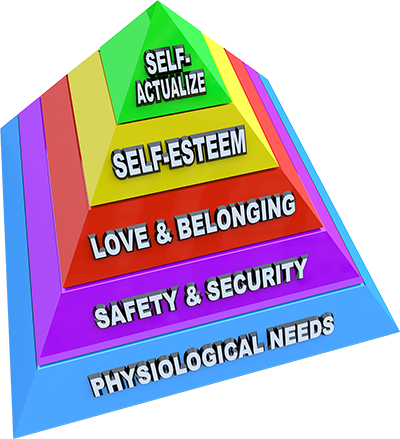What Men Look For in Life

Maslow’s hierarchy of needs is a theory that proposes that humans have five categories of needs that motivate their behaviour. I find this to be particularly true for men.
The needs are:
- Physiological needs: the basic needs for survival, such as food, water, air, and shelter.
- Safety needs: the needs for security, stability, and protection from harm.
- Social belonging: the needs for love, affection, and belongingness with others.
- Esteem: the needs for respect, recognition, and self-worth.
- Self-actualization: the needs for personal growth, fulfillment, and creativity.
Physiological Needs
These are biological requirements for human survival, e.g., air, food, drink, shelter, clothing, warmth, sex, and sleep. Our most basic need is for physical survival, and this will be the first thing that motivates our behavior. Once that level is fulfilled, the next level up is what motivates us, and so on. The human body cannot function optimally if physiological needs are not satisfied. Maslow considered physiological needs the most important as all the other needs become secondary until these needs are met. Once an individual’s physiological needs are satisfied, the need for security and safety becomes salient.
Safety Needs
People want to experience order, predictability, and control in their lives.
Safety needs can be fulfilled by the family and society. For example, police, schools, business, and medical care, emotional security, financial security, employment, social welfare, law and order, freedom from fear, social stability, property, health, and wellbeing, such as safety against accidents and injury.
After physiological and safety needs have been fulfilled, the third level of human needs is social and involves feelings of belongingness.
Love and Belongingness Needs
This refers to a human emotional need for interpersonal relationships, affiliating, connectedness, and being part of a group. Examples of belongingness needs include friendship, intimacy, trust, acceptance, receiving and giving affection, and love. This need is especially strong in childhood and can override the need for safety, as witnessed in children who cling to abusive parents.
Esteem Needs
These are the fourth level in Maslow’s hierarchy and include self-worth, accomplishment, and respect. Maslow classified esteem needs into two categories: 1. esteem for oneself, in the form of dignity, achievement, mastery and independence and 2. The desire for reputation or respect from others, such as status and prestige. Esteem presents the typical human desire to be accepted and valued by others. People often engage in a profession or hobby to gain recognition. These activities give the person a sense of contribution or value.
Low self-esteem or an inferiority complex may result from imbalances during this level in the hierarchy. Maslow indicated that the need for respect or reputation is most important for children and adolescents and precedes real self-esteem or dignity.
Self-actualisation Needs
These are the highest level in Maslow’s hierarchy, and refer to the realisation of a person’s potential, self-fulfillment, seeking personal growth, and peak experiences.
This level of need refers to what a person’s full potential is and the realisation of that potential. Maslow describes this level as the desire to accomplish everything that one can, and to become everything one is capable of becoming. Individuals may perceive or focus on this need very specifically. For example, one individual may have a strong desire to become an ideal parent. In another, the desire may be expressed athletically. For others, it may be expressed in paintings, pictures, or inventions.
Although Maslow did not believe that many of us could achieve true self-actualisation, he did believe that all of us experience transitory moments, which he referred to as peak experiences of self-actualisation. Such moments, associated with personally significant events such as childbirth, sporting achievement and examination success, are difficult to achieve and maintain consistently.
Survive, Thrive and Stratagise
The two lower levels are fundamentally things that a man can do alone, these are known as survive and thrive skills. The next three levels are all about socialisation and the development of a social trusted group.
The skill set varies from the survival strategy of the lowest levels and start to develop a sharing and inter reliant identity, something which allows you to achieve the goals you feel are worthwhile, require sacrifice and hard work to get something in the future, a directional discipline.
The remaining levels relate to the goals you set being achieved and secure. It is protectionist.
You need to be observant and alert, use acquired wisdom to steer and work together to the fruition of your deep desires. Achieving a worthwhile life, consolidating your life. This process is intensely satisfying and rewarding despite all the obstacles that have been overcome but continuing to be aware of those still to come. Being recognised and rewarded for your contribution in the life of those you care for.



